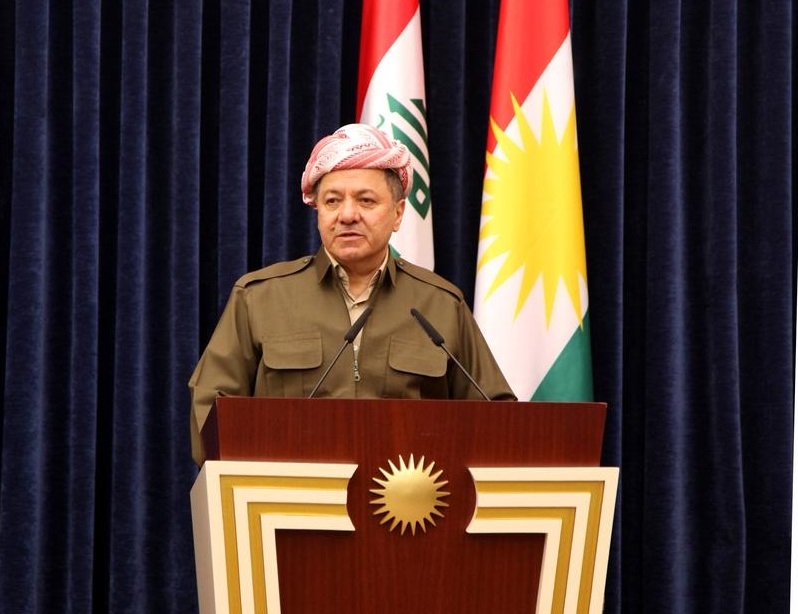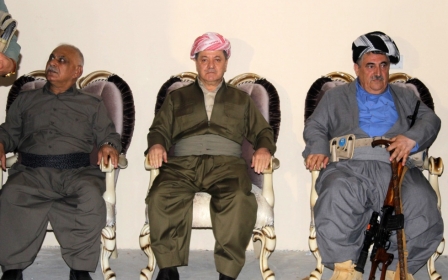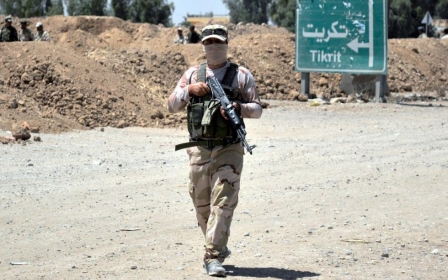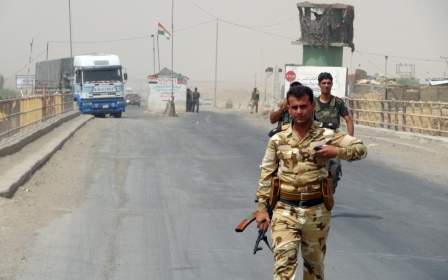Kurdish president calls for referendum on independence

Erbil, Iraq - The president of Iraqi Kurdistan Massoud Barzani on Thursday called on the autonomous region’s parliament to make preparations for a referendum on self-determination.
This marked the first time that leaders of Iraqi Kurdistan have taken an official move toward a possible secession from Iraq.
Speaking to lawmakers in a session behind closed doors in the Kurdistan Region’s capital city, Erbil, Barzani said holding a referendum will “strengthen our position and will be a strong weapon in our hands.”
Lawmakers decided to make the session closed because of the “sensitivity” of the matter.
“It’s time for us to determine our fate,” said Barzani who has been the president of Iraqi Kurdistan since 2005. “We should not wait for others to decide on our fate.”
“An involuntary union will never work,” he warned about forcing Kurds to stay a part of Iraq.
As Barzani spoke a few dozen supporters gathered outside the parliament building waving Kurdish flags and wearing the local traditional Kurdish and Assyrian Christian costumes.
Omed Khoshnaw, head of the Barzani-led Kurdistan Democratic Party (KDP)’s bloc in Kurdish parliament said “two referendums will likely take place.”
First, a referendum would be held in areas contested by both the Kurdish and the Iraqi governments, on whether local populations wanted to join Kurdistan or be under the federal government’s control in Baghdad. Then in the next phase, a general referendum on independence from Baghdad would take place in areas under the Kurdish government’s control.
Disputed areas include large swathes of energy-rich land that spreads across four northern and central provinces in Iraq, most notably Kirkuk.
Given the threat posed by the Sunni Arab militants, in particular the Islamic State (IS), Kurdish authorities expect that the majority of the population in these contested areas would choose to become part of the Kurdish region if given the choice.
Khoshnaw said by the end of July the legislature will form a commission to manage the referendum and future elections in Kurdistan.
Kurdish calls for independence have drawn the ire of politicians in Baghdad.
During a televised speech on Wednesday, Iraq’s embattled Shia Prime Minister Nouri al-Maliki firmly warned the Kurds against “the dangers of thinking about secession and self-determination.”
But with Kurdish-controlled areas largely separated from areas under Baghdad’s control, Maliki’s government might not have much of choice if the Kurds choose to throw down the gauntlet.
Following the takeover of large parts of the Sunni Arab areas of northern and central Iraq in mid-June, the Iraqi army abandoned its positions in most of the disputed territories.
With the exception of a couple small districts, almost all of these areas are now under the control of the Kurdistan Regional Government (KRG)’s armed forces.
Independence: A double edged sword
However, even with this rapid reversal of facts on the ground that has suddenly emboldened Kurdistan, the road to independence is rarely an easy one.
The West originally hinted that Kurds should be independent after the fall of Ottoman Empire in 1920s but this was not to be. They have since waged lengthy political and guerilla campaigns for independence, to little avail.
Turkey, Iraq, Syria and Iran - which harbor the vast majority of the region’s Kurds - have often cracked down hard on any inkling of separatist sentiment.
As the prospect of Kurdish independence has increased, so too have tensions with some international players.
Iran has recently vocally denounced the possibility of an independent Kurdish state. Turkey, which traditionally acted as a bulwark of Kurdish nationalism, has softened its stance in recent years but Ankara sent mixed signals. Some politicians now express relative support for an independent Iraqi Kurdistan but others still oppose it.
US Secretary of State John Kerry has also urged for restraint and called on Kurds to take an active part in building Iraq’s new government.
But Kurdish officials have gone on a charm offensive, trying to reassure states that they will benefit from independence.
“Our message is Kurdistan will add to the stability of the region, Kurdistan will add to the fight against terrorism, Kurdistan will add to the energy security of the world… Kurdistan will be part of solution and progress in the Middle East,” said Hemin Hewrami, head of foreign relations in Barzani’s KDP, while stressing that there would be no backing off from the decision to organise a referendum.
“So the message is will they accept a source of stability and recognise it or will they recognise this chaos that we have in Baghdad, Mosul, Tikrit and other places.”
The prospect of an independent Kurdistan has subsequently attracted support from some rarely publicised friends.
Earlier this week, Prime Minister Benjamin Netanyahu told a university think tank in Tel Aviv that Kurds “are worthy of” independence.
Some Kurds have worried that the statements by Israeli officials might spark more opposition in Arab circles toward Kurdish independence, but others argue that mutual relations between an independent Kurdistan and Israel are not taboo.
“There is no obstacle or religious reason that countries should not have relations with each other, be that Israel or any other state,” said Mala Marwan Galali, an MP with the Kurdistan Islamic Group, a party that is at times seen as fundamentalist.
”In diplomatic relations it is common interests that count. And if [after independence] we have common interests with any country, we will not be ashamed to establish relations with them.”
According to lawmakers, Barzani sounded optimistic that the Kurdish state would not face significant opposition from United Nations’ member states.
Barzani told Kurdish politicians at Thursday’s closed session that there is international support for Kurdish independence and “those who do not support us; do not oppose us as well.”
Rising call of separatists
With Iraq mired in unprecedented turmoil which has seen swaths of territory fall to militants like IS, Kurds have expressed deep disappointment about the direction the country is heading.
This may have pushed leaders to become more vocal in their calls for independence but tensions have been rising for some time.
Kurds started selling oil to international clients back in May, a milestone in Kurdish efforts to achieve a greater degree of economic independence. Over the last decade, they have also grown richer and developed into a consumer society that gets much of its goods from abroad, especially neighboring Turkey and Iran.
All of these developments have paved the way for the referendum which seems broadly popular with the majority of Kurds.
“All parliamentarians agreed to the call for referendum,” said Ali Hama Salih, the most popular Kurdish MP from Change Party, the parliament’s second largest bloc.
“No one did officially challenge the idea of holding a referendum,” added Salih whose party was until last year an opposition group.
There is no deadline set for holding a referendum on self-determination although several MPs Middle East Eye spoke with have already called for the process to be expedited.
But there are still those in Kurdistan who are uncertain what an independent future might bring.
Picking up items off of the shelves of a mini market in a middle class neighborhood in Erbil, Siyamand Hamid says independence will perhaps bring about an end to the Kurds’ troubles in Iraq.
“But life might be difficult for a while. Some neighbors might react negatively to this and close borders… But nothing happens easily and without a price,” he said.
So even as public excitement continues to grow many understand that while the future may eventually be brighter the road ahead, especially in such a volatile region, remains uncertain.
“The best time for declaring Kurdish independence is when Kurds’ disputes with Baghdad have been resolved because then Kurds can realise their goal of independence under better circumstances,” Farid Assasard, a senior official in the Patriotic Union of Kurdistan, told the Turkish Anadolu agency.
New MEE newsletter: Jerusalem Dispatch
Sign up to get the latest insights and analysis on Israel-Palestine, alongside Turkey Unpacked and other MEE newsletters
Middle East Eye delivers independent and unrivalled coverage and analysis of the Middle East, North Africa and beyond. To learn more about republishing this content and the associated fees, please fill out this form. More about MEE can be found here.




